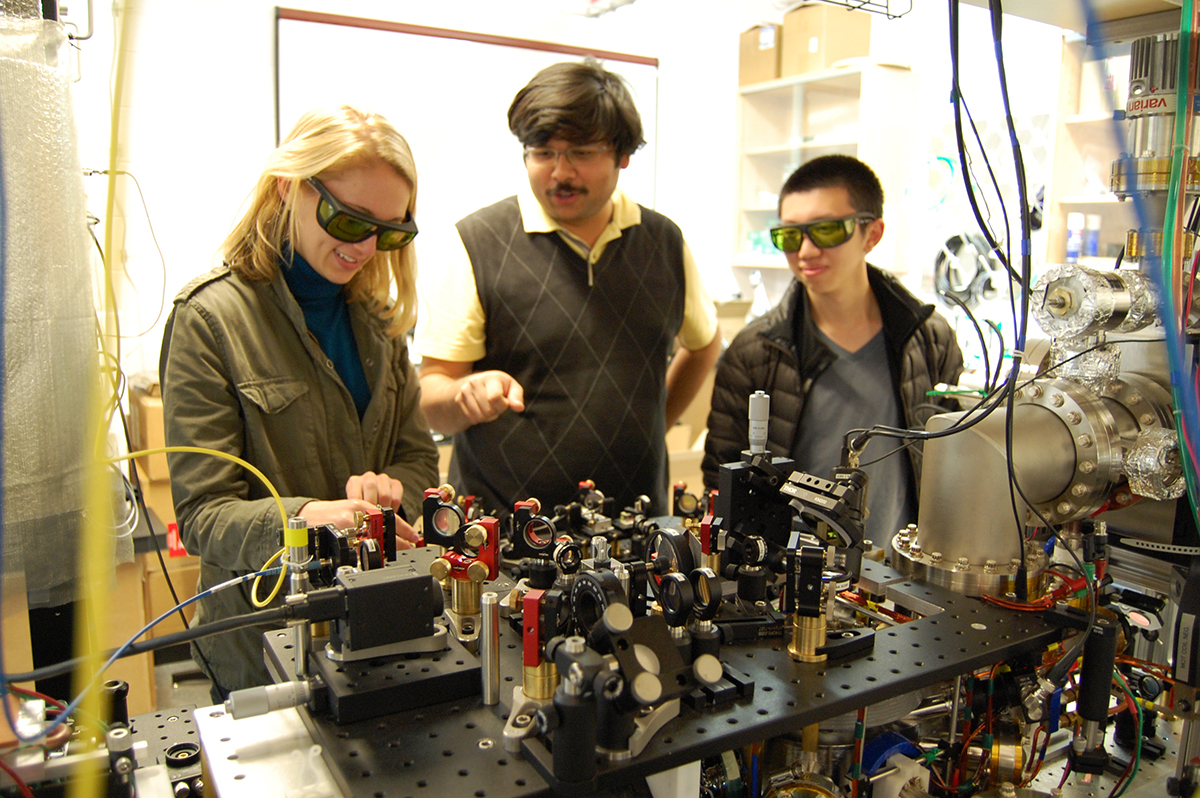'Zeno effect' verified: Atoms won't move while you watch
By Bill Steele

One of the oddest predictions of quantum theory – that a system can’t change while you’re watching it – has been confirmed in an experiment by Cornell physicists. Their work opens the door to a fundamentally new method to control and manipulate the quantum states of atoms and could lead to new kinds of sensors.
The experiments were performed in the Utracold Lab of Mukund Vengalattore, assistant professor of physics, who has established Cornell’s first program to study the physics of materials cooled to temperatures as low as .000000001 degree above absolute zero. The work is described in the Oct. 2 issue of the journal Physical Review Letters
Graduate students Yogesh Patil and Srivatsan Chakram created and cooled a gas of about a billion Rubidium atoms inside a vacuum chamber and suspended the mass between laser beams. In that state the atoms arrange in an orderly lattice just as they would in a crystalline solid. But at such low temperatures the atoms can “tunnel” from place to place in the lattice. The famous Heisenberg uncertainty principle says that position and velocity of a particle are related and cannot be simultaneously measured precisely. Temperature is a measure of a particle’s motion. Under extreme cold velocity is almost zero, so there is a lot of flexibility in position; when you observe them, atoms are as likely to be in one place in the lattice as another.
The researchers demonstrated that they were able to suppress quantum tunneling merely by observing the atoms. This so-called “Quantum Zeno effect,” named for a Greek philosopher, derives from a proposal in 1977 by E.C. George Sudarshan and Baidyanath Misra at the University of Texas, Austin, who pointed out that the weird nature of quantum measurements allows, in principle, for a quantum system to be “frozen” by repeated measurements.
Previous experiments have demonstrated the Zeno effect with the “spins” of subatomic particles. “This is the first observation of the Quantum Zeno effect by real space measurement of atomic motion,” Vengalattore said. “Also, due to the high degree of control we’ve been able to demonstrate in our experiments, we can gradually ‘tune’ the manner in which we observe these atoms. Using this tuning, we’ve also been able to demonstrate an effect called ‘emergent classicality’ in this quantum system.” Quantum effects fade, and atoms begin to behave as expected under classical physics.
The researchers observed the atoms under a microscope by illuminating them with a separate imaging laser. A light microscope can’t see individual atoms, but the imaging laser causes them to fluoresce, and the microscope captured the flashes of light. When the imaging laser was off, or turned on only dimly, the atoms tunneled freely. But as the imaging beam was made brighter and measurements made more frequently, the tunneling reduced dramatically.
“This gives us an unprecedented tool to control a quantum system, perhaps even atom by atom,” said Patil, lead author of the paper. Atoms in this state are extremely sensitive to outside forces, he noted, so this work could lead to the development of new kinds of sensors.
The experiments were made possible by the group’s invention of a novel imaging technique that made it possible to observe ultracold atoms while leaving them in the same quantum state. “It took a lot of dedication from these students and it has been amazing to see these experiments be so successful,” Vengalattore said. “We now have the unique ability to control quantum dynamics purely by observation.”
The popular press has drawn a parallel with the “weeping angels” depicted in the “Dr. Who” television series – alien creatures who look like statues and can’t move as long as you’re looking at them. There may be some sense to that. In the quantum world, the folk wisdom really is true: “A watched pot never boils.”
The research was supported by the Army Research Office, the Defense Advanced Research Projects Agency under its QuASAR program and the National Science Foundation.
Recent Ph.D. graduate Chakram is now at the University of Chicago.
Media Contact
Get Cornell news delivered right to your inbox.
Subscribe